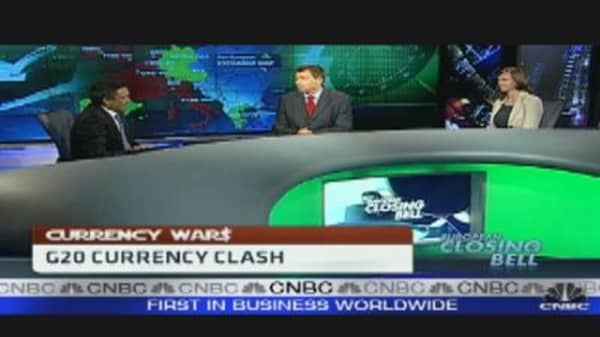During the past week, Geithner has made more comments about the dollar than he's made in months. In a Wall Street Journal interview in Thursday's paper, Geithner said the major currencies (euro and yen) are "roughly in alignment now," and that the U.S. will pursue an approach that would encourage China and other countries to let their exchange rates appreciate. Geithner also said earlier in the week that the U.S. goal is not to devalue the dollar.
"He is basically saying the U.S. will not use the dollar like a weapon..We're going to use policy that's in our interest, but if the dollar falls so be it. We are not targeting the dollar, and the dollar does not need to fall against the major currencies. He seems to be targeting the problem towards China," said Marc Chandler, chief currency strategist with Brown Brothers Harriman. Chandler said Geithner, by commenting on the euro and yen, is also articulating a position for G-7 countries, who meet Friday ahead of the larger G20 gathering.
"I think China resists them ganging up on them...I think it's sort of like Don Quixote going after the windmills. I don't think that's really where the problem is. I think it's a marginal factor," Chandler said of the Chinese currency. "The problem is they're a younger population than the U.S. and they're growing faster. Where they are in their development is they're basically saving a lot of money, and I think what they want to do is avoid some of the excesses."
Chinese officials have said their currency is not the problem, and that the U.S. needs to control its deficits. The U.S. contends that by keeping its currency low, China artificially cheapens prices for its good, crowding out others in world markets. Geithner also said the finance ministers are going to try to pursue efforts toward a "rebalance" of the world economy so it is less reliant on U.S. consumers for growth.
Magnus believes China should move on its currency, and it should do so sooner rather than later because the adjustment will get increasingly difficult.
"There has to be an almost Breton Woods kind of thing, acknowledging the global system is worth saving but not only the debtors have a responsibility to put their house in order, but that creditors have obligations too...I don't think its going to happen, at least not voluntarily," he said.
China this past week raised interest rates for the first time since the financial crisis began.
"It's happened before and I think it was tactically astute for China to take the sting out of the issue, especially before big meetings like G20, so it doesn't get attacked," said Magnus, the author of an upcoming book on China.
Chandler said there were market rumors that Geithner is seeking a very specific 3 percent move in the yuan before the November G20 meeting, and that he is pushing for another 3 percent move between November and January. China recently has let its currency rise very slightly, but less than 3 percent, against the dollar since early September.
"There will be a statement this weekend. The communiqué will paper over some differences, but only the heads of state can engineer peace," said Chandler, adding more will be resolved at the November meeting.
Chandler said the dollar may actually be getting ready to break its downtrend, but that won't likely happen before the U.S. mid-term election Nov. 2 and the Fed's meeting Nov. 3, where it is expected to announce further easing. "The last four or five days was very choppy. I really thought the 1.40 level in the euro was going to be the top," said Chandler. The euro has made several recent runs to 1.40 but then backed away each time.
"Short-term momentum players, hedge funds have models that would still be selling the dollar, but it's getting close to New Year's eve at the party. I think we have two more weeks. I think this week showed us how hard the dollar can reverse," he said.
The Fed is expected to announce Nov. 3 that it will restart a program to buy Treasury securities, an event highly anticipated by the markets. The steep decline in the dollar, and coinciding rise in risk assets, like stocks and commodities, was triggered when the Fed began discussing so-called quantitative easing in late August.
"The Chinese have a good way of putting it. All thunder, no rain," said Chandler, noting just the whiff of easing has helped encourage the intended result in markets. "The key figures (Fed Chairman Ben) Bernanke and (New York Fed President William) Dudley have made very clear about the need to have more easing. If they do not ease now, it will be more destabilizing for the market than if they do this quantitative easing."
- Follow me on Twitter @pattidomm.
Questions? Comments? Email us at marketinsider@cnbc.com





